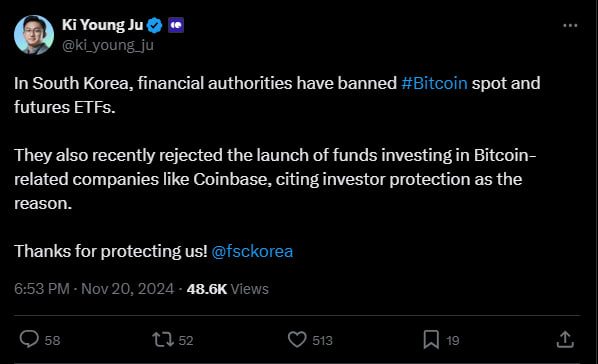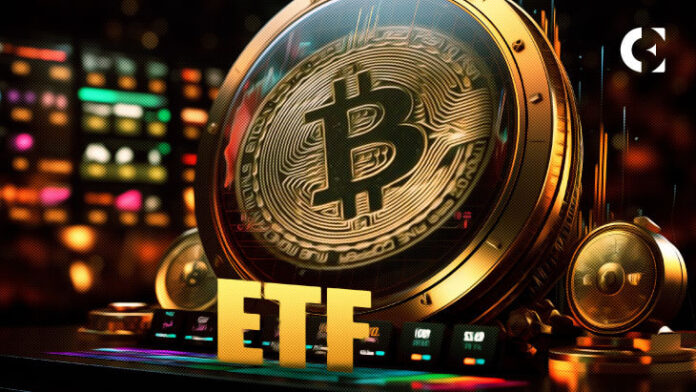- South Korea bans Bitcoin ETFs, citing investor safety, sparking regulatory criticism.
- International adoption of crypto ETFs is rising as South Korea implements stricter funding guidelines.
- Restrictive insurance policies may hamper South Korea's position within the evolving digital asset market.
South Korea has as soon as once more reined in its crypto laws by banning Bitcoin spot and futures ETFs, blocking funds that put money into digital asset firms like Coinbase.
In line with Ki Younger Ju, founder and CEO of CryptoQuant, these restrictions are meant to guard buyers, however critics say they’re extreme and hinder the nation's alignment with world developments in digital asset regulation.


Ban extends past Bitcoin to digital asset firms
The Monetary Supervisory Service (FSS) lately confirmed the rejection of ETFs concentrating on firms with enterprise fashions primarily based on digital property. Asset administration firms had deliberate to introduce ETFs targeted on firms like Coinbase, a number one cryptocurrency change.
Regardless of being able to launch instantly, these funds have failed to realize approval. Because of this, many home asset managers have suspended plans to submit purposes for comparable ETFs, carefully monitoring FSS actions.
This rejection is reportedly primarily based on the “emergency digital foreign money measures” adopted by South Korea in 2017, which stop monetary establishments from buying and selling digital property. Though this administrative directive goals to guard buyers, it has been criticized for missing a transparent authorized foundation, particularly since firms like Coinbase are publicly traded and controlled by monetary legal guidelines established overseas.
International developments diverge from South Korea's method
Internationally, the regulatory surroundings for cryptocurrency investments is turning into more and more tolerant. For instance, the US market launched leveraged ETFs linked to Coinbase in 2022.
These merchandise have achieved vital buying and selling volumes, with current day by day exercise exceeding $1 trillion. Moreover, U.S. exchanges now make it simpler to commerce crypto ETFs and spot choices, in stark distinction to South Korea's restrictive insurance policies.
Additionally learn: South Korean metropolis seizes and sells crypto for unpaid taxes
By blocking investments in digital asset firms, South Korea dangers isolating itself from world advances in cryptocurrency regulation. Critics argue that this method limits home buyers' alternatives to diversify their portfolios.
Additionally they spotlight the inconsistency of making use of the 2017 tips to publicly traded firms, suggesting that this might hurt the nation's aggressive benefit within the digital property market.
Disclaimer: The knowledge introduced on this article is for informational and academic functions solely. The article doesn’t represent monetary recommendation or recommendation of any sort. Coin Version is just not answerable for any losses arising from using the content material, services or products talked about. Readers are suggested to train warning earlier than taking any motion associated to the corporate.
